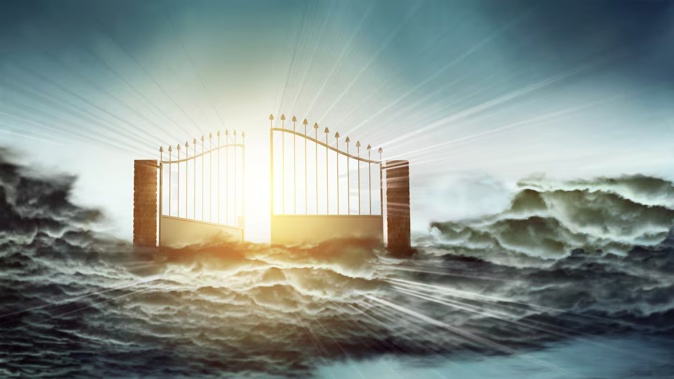
Life as we know it is ending today, according to TikTok. Or maybe tomorrow at the latest.
Apocalyptic influencers are all over social media with warnings, tips and tricks for the impending rapture, fuelled largely by the predictions of an obscure pastor who linked biblical Armageddon to this week’s observance of the Jewish new year, Rosh Hashanah.
But the world has failed to end so many times before – the Y2K bug in 2000, the supposed Mayan apocalypse in 2012 and the notoriously flaky Planet X that was repeatedly predicted to smash into Earth.
It’s unclear how many of the influencers helping drive “RaptureTok” up the trending lists even take it seriously.
For example, what to make of the TikToker “rapture_now”, who laced his apocalyptic warnings with garish sound effects and talk of aliens (and who appears to have deleted several of his videos while this article was being written)?
Or the woman who prepared laminated index cards for anyone left behind on rapture day (“Where did everyone go?”), and organised the seven seals from the Book of Revelation into a colour-coded bar chart?
Or Tilahun Desalegn, an online evangelist who has posted hundreds of ecstatic videos about the rapture for his nearly 30,000 followers and pointed to a blood moon in Australia as evidence?
We can hardly blame the internet for humanity’s periodic bouts of end-times fervour, which long predate Christianity, let alone the “End Times” page on Christianity.com.
Books are literally filled with examples of unrealised predictions from the last millennia, encompassing everything from Evangelical Christian beliefs that Jesus will return to earth and collect the faithful, to fears of nuclear weapons and AI.
In 2022, the Pew Research Centre found that 39% of American adults believed that “we are living in the end times”.
As social media algorithms get better and better at boiling global discourse down to a few catchy hashtags, the apocalypse has never felt more in-your-face.
This latest wave of predictions is based on a religious podcast video that slowly gained views after it was posted in June.
In it, South African pastor Joshua Mhlakela claimed to have received a vision from Jesus.
“He says to me, ‘On the 23rd and 24th of September, 2025, I will come to take my church,’” Mhlakela says in the clip, which has over 570,000 views.
Mhlakela’s prediction quickly outgrew the podcast where it originated (CentTwinz, whose latest offering on YouTube is titled “How My Father wanted to SACRIFICE me for money RITUALS will Shock U”).
It now resonates in hundreds of TikTok videos, as well as Facebook groups with hundreds of thousands of members and names like “RAPTURE WARNING GROUP.”
Today on Google, searches for “rapture” outpaced those for Taylor Swift.
TikTokers are particularly, er, enraptured with the idea of the world ending this week. “I truly believe that we will be rapture during Feast of Trumpets this year,” the user “romans.ten. 9through11” said in a four-minute goodbye video, with nearly 40,000 likes.
Arguably, the theory is being pushed by as many comedians and traffic chasers as true believers.
“You will not be getting into heaven if you are still in ownership of a fall/winter 1996 Alexander McQueen piece,” fashion influencer Arabella Bartelloni told her followers, presumably joking. “That is rotted with the devil.”
Mark Roberts, 24, didn’t take the rapture videos bouncing around online seriously. “It’s like a generational divide,” he said. “Us young people are looking at the older people and being like, ‘What the heck?’ And the older generation is looking at the younger generation and being like, ‘Take us seriously.’”
His scepticism hasn’t stopped him from getting in on the action. Roberts posted a video to his over 1.5 million TikTok followers describing a naked woman screaming at the sky he saw outside his apartment building.
He assumed it had something to do with the chatter around the rapture. When he checked for the woman later in the morning, she wasn’t there.
This isn’t even the first time the world was supposed to end on this day of the month. That was also the case in 2017 when a mysterious celestial body known as Nibiru or Planet X was predicted to appear in the sky and shortly thereafter crash into Earth, according to the prolific conspiracy theorist David Meade, whose calculations were based on a solar eclipse rather than a Jewish holiday.
When Planet X failed to show at the appointed time, believers moved its due date to November, and then to the following April.
Planet X theories also went viral earlier, in 2012, when they intersected with popular beliefs that the Mayan calendar predicted an apocalypse that year. The hype got so intense at one point that a senior Nasa scientist released a video debunking doomsday.
One could argue that the 21st century is inextricably linked to Armageddon theories, after a widespread panic at the turn of the millennium held that technological catastrophe would strike the world on New Year’s 2000 because computers couldn’t handle all the new zeros.
And 2000 was also the year that the first Left Behind movie was released, based on the best-selling book series by Jerry B. Jenkins and the Baptist minister Tim LaHaye, in which millions of people disappear during a biblical rapture.
The film was hardly a blockbuster, but it has been followed up by no end of spin-offs and other end-times media, including critically acclaimed shows such as The Leftovers and Unbreakable Kimmy Schmidt.
And then there’s the incessant ticking of the scientist-endorsed Doomsday Clock, which estimates the world’s risk of actually ending because of nuclear war, climate change or some other nonfictional disaster. It moved one second closer to doomsday in January.
So maybe it’s no wonder that world seems abuzz with talk of its end.
And even if no apocalypses have yet come to fruition, who’s to say we shouldn’t party like it’s 1999?
Take your Radio, Podcasts and Music with you









